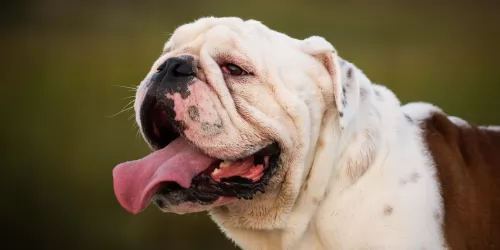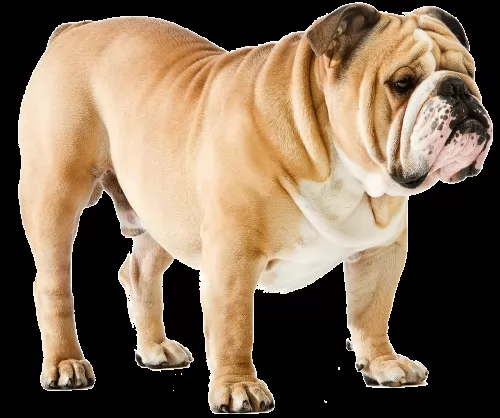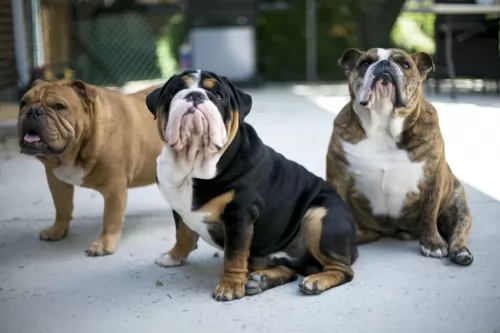 Petzlover
Petzlover English Bulldog is originated from United Kingdom but Danish Broholmer is originated from Denmark. English Bulldog may grow 35 cm / 13 inches shorter than Danish Broholmer. English Bulldog may weigh 35 kg / 77 pounds lesser than Danish Broholmer. Both English Bulldog and Danish Broholmer has same life span. English Bulldog may have less litter size than Danish Broholmer. English Bulldog requires Low Maintenance. But Danish Broholmer requires Moderate Maintenance
English Bulldog is originated from United Kingdom but Danish Broholmer is originated from Denmark. English Bulldog may grow 35 cm / 13 inches shorter than Danish Broholmer. English Bulldog may weigh 35 kg / 77 pounds lesser than Danish Broholmer. Both English Bulldog and Danish Broholmer has same life span. English Bulldog may have less litter size than Danish Broholmer. English Bulldog requires Low Maintenance. But Danish Broholmer requires Moderate Maintenance
 At earlier time English Bulldogs were not as it was now. They were taller and was fierce in their nature. They were completely developed in England.The first breed was set in at about 1500. After that they were involved in a game called Bull baiting in England, where a fight was set in between a Bull and the Bulldog.
At earlier time English Bulldogs were not as it was now. They were taller and was fierce in their nature. They were completely developed in England.The first breed was set in at about 1500. After that they were involved in a game called Bull baiting in England, where a fight was set in between a Bull and the Bulldog.
English Bulldogs will be on full fierce by biting and holding the bull even when they jump or struggle, until they fall on the ground. After that Bull baiting was banned in England, and everyone thought Bulldog will disappear. But some breeders re engineered it and made it as it was now. In 1950s Bulldogs ranked among top 10 in America.
 The Danish Broholmer is also known as the Danish Mastiff. This is a large dog which comes from Denmark.
The Danish Broholmer is also known as the Danish Mastiff. This is a large dog which comes from Denmark.
Known as a molosser breed, the dog used to fulfill a guard dog role in the home of wealthy Danish people. There are those who take one look at the dog’s size and build, and regard him as aggressive, when in fact he is a calm, good-tempered dog.
The origin of this large dog breed goes way back to the Middle Ages, although details of the dog’s origins are unknown. The Broholmer comes from mixing the English Mastiff and various local German breeds, being named after the Sehested of Broholm.
The dog all but became extinct during the Second World War. It was in 1974 that the Danish Kennel Club started looking to revive the breed. The breed was revived and the dog was imported to the United Kingdom in 2009. The Danish Broholmer has been recognized by the United Kennel Club in 2006.
 English Bulldogs are muscular in nature. They easily gain over weight and so exercising them is very mandatory. They are well suitable for apartment living, since they will always like to lie down and sleep. They will woke up only for their food. But they are very much faithful for their owners and it will be seen very loving when they come near and look at you.
English Bulldogs are muscular in nature. They easily gain over weight and so exercising them is very mandatory. They are well suitable for apartment living, since they will always like to lie down and sleep. They will woke up only for their food. But they are very much faithful for their owners and it will be seen very loving when they come near and look at you.
Since they face respiratory problems they should not be compelled to play for very long time. Their look may be ferocious but they are very calm and loving towards others unless you do any harm to them or their owners.
 The Danish Broholmer is a large dog that looks familiar to the Mastiff. The dog stands roughly between 66 and 75cm and weighs between 40 and 60kg.
The Danish Broholmer is a large dog that looks familiar to the Mastiff. The dog stands roughly between 66 and 75cm and weighs between 40 and 60kg.
The body is strong and muscular and he has the large head of the molosser. The coat of the dog is short and harsh, with the color being fawn, light brown, yellowish or black. He is quite a heavy shedder and will require brushing twice a week.
The dog usually has a black mask.The muzzle is also large, the nose black. His ears are medium-sized, set high and floppy, the chest deep. The tail is long and carried downwards.
The Danish Broholmer is an awesome family pet who seems to go out of his way to please his human family. He is an intelligent dog and obedient by nature. Because he is so devoted to his human family, he wants to protect them too.
He is a non-aggressive dog and the best part about owning such a dog is that he is a gentle pet for the family but he still looks threatening to intruders.
The Danish Broholmer gets on well with children and pets in the home. However such a big dog needs to be trained and socialized and he could jump up against smaller people and unintentionally send them flying. Training will see to it that he responds well do simple commands such as ‘down’, ‘sit’, lie-down’ and ‘come’.
 They are good companion for children, but it is recommended to have an adult supervision and not allowing them alone.
They are good companion for children, but it is recommended to have an adult supervision and not allowing them alone.
They are the best companion dogs. They take decisions after thinking for a while. They are very faithful for their owners, and if anybody does harm to their owners infront of them, then they will show their full energy and teach a lesson to them.
They adapt well for apartment living. They can be leaved alone in home for some hours but they love to stay with anyone in the house. English Bulldog love to live in moderate weather, both hot and cold weather will bring problems to them.
Bulldog will not do all things you order them, as they think well and take their decision well. They think what will they get by doing what you say, and then only they will do it.
 Once people have owned a Danish Broholmer, they have got nothing but good comments about them. You hear words such as courageous, sweet, good-natured, playful and intelligent. Also if he believes his family is in danger he will want to protect them.
Once people have owned a Danish Broholmer, they have got nothing but good comments about them. You hear words such as courageous, sweet, good-natured, playful and intelligent. Also if he believes his family is in danger he will want to protect them.
He is a great friend for child and adult and a fairly low maintenance breed too. He is an adaptable dog, but his size isn’t suited to small, cramped spaces. He will need to be exercised but this should be a pleasure as every human being can use some additional exercise themselves if they want to remain healthy.
Look after your wonderful amicable Danish Broholmer and he’ll shower you with his doggy love and devotion.
 They have chances of getting problems due to brachycephalic syndrome, this is because of their short face. Also they suffer from respiratory problems. Bone and joint problems are also common in them.
They have chances of getting problems due to brachycephalic syndrome, this is because of their short face. Also they suffer from respiratory problems. Bone and joint problems are also common in them.
English Bulldog has chances of getting skin problems and hair fall is the initial for those skin problems. Normally they shed hair upto a considerable level.
 The Danish Broholmer is a large dog who can consume quite a lot of food. With large dogs like these, there is often strain on the dog’s joints.
The Danish Broholmer is a large dog who can consume quite a lot of food. With large dogs like these, there is often strain on the dog’s joints.
Also dogs with deep chests are also prone to gastric dilatation volvulus or bloat. In fact, large dogs can also suffer with obesity apart from joint problems. It is why they often live shorter lives than smaller dog breeds. Some points to consider with your large breed pet -
Nutrition is most important for puppies and your adult dog. Don’t overfeed your large breed puppy as he can grow too quickly so that his joints are at risk of injury.
Too much weight gain as well as too much exercise can increase the risk of your dog developing hip dysplasia. This is a hereditary disorder, causing problems with the hips. The disease can lead to terrible pain and sometime lameness. Always remember to keep the weight of your dog in a healthy range to prevent pressure on the joints.
 English Bulldog puppy needs more energy and nutrients for its growth, so they must be fed several times a day but the amount should be less. They should not be given raw meat and foods that may be gone bad. The food given to puppy should be allowed to eat for only 20 minutes. After that time if balance food remains in bowl they should be removed and for the next meal new food should be given.
English Bulldog puppy needs more energy and nutrients for its growth, so they must be fed several times a day but the amount should be less. They should not be given raw meat and foods that may be gone bad. The food given to puppy should be allowed to eat for only 20 minutes. After that time if balance food remains in bowl they should be removed and for the next meal new food should be given.
The puppy shall be given cooked food which we eat and it is preferable to give cooked meat and bones three times a week. Salt should be added less for them and sugar should not be given.
The bulldog can be fed 1 to 2 times per day, that is morning and evening. It is not recommended to give them soybean oil, chocolates and onions. Kibbles can also be given to them.
Nutritional food is the main factor for their health and the vaccinations should be made at the right time with consulting the veterinarian.
English Bulldogs may have less energy, but they love to play. They can be made to chase after a ball or Frisbee. But short chasing will be good for them. They should not be made to play in hot sun as they suffer with some heat problems. Also they are interested in playing Tug of war, Hide and seek and solving puzzles.
 For his size, you’d be inclined to think that the Danish Broholmer will require a lot of exercise, but in fact he is much like any other other. He will love to join you on your daily walks and will readily run to fetch a ball.
For his size, you’d be inclined to think that the Danish Broholmer will require a lot of exercise, but in fact he is much like any other other. He will love to join you on your daily walks and will readily run to fetch a ball.
Your Danish Broholmer will require quality food manufactured exclusively for large dog breeds.
There are excellent manufactured dog foods out there and you can take the kibble and mix in some home-made foods from time to time such as cooked brown rice, vegetables and chicken. He will also require some raw meat added into the diet occasionally.
Never leave him without a constant supply of cool, fresh water.